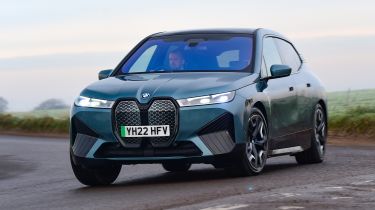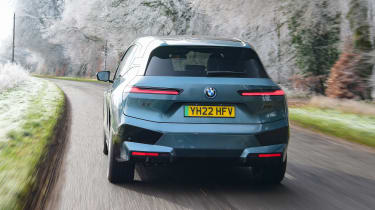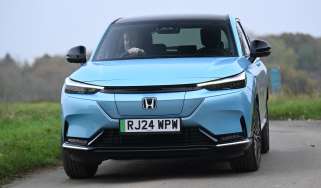BMW iX review - Electric motor, drive and performance
A surprisingly accomplished drive, the BMW iX is hard to fault on the road

While BMW’s all-electric iX3 SUV is based on the combustion-engined X3 model, the bigger iX uses a dedicated EV platform and the manufacturer’s fifth-generation eDrive electric motors. The revised motors are more efficient than the set-up found in the now-discontinued i3, and also allow the iX’s torque to be delivered more easily at higher speeds – so you shouldn’t see acceleration tail off as you push on.
If you view the iX in terms of raw power then all seems well, with the entry xDrive40 model offering 322bhp, and the 516bhp xDrive50 and 611bhp M60 providing progressively more gobsmacking levels of punch. What isn’t so great is the iX’s hefty 2.4-tonne kerbweight, which raises a question over the impact on its ride and handling.
Well, you needn’t worry, because the iX is superb to drive; surprisingly agile through the twisty stuff and providing decent steering feel, it offers bags of grip and fills you with confidence as you turn into a corner. The throttle is easy to modulate, too, whether you’re in slower town traffic or travelling more quickly down an A or B road.
The iX isn’t too shabby on longer motorway journeys, either, where you’ll notice just how quiet the cabin is. There’s no typical electric whine from the motors working away underneath and just the faintest undertone of wind noise when up to speed. All this, coupled with the iX’s ability to soak up almost any bump in the road, makes it difficult to find a negative aspect of how BMW’s flagship electric car drives.
While not a full-blown M division product, the M60 gets revised air suspension and even an augmented soundtrack through its Bowers & Wilkins sound system to amp up the excitement. In fast, sweeping bends, it has impervious grip and very little body roll, but sharper hairpins do expose the iX’s size and sheer weight.
Used - available now
Its steering responds quickly, but the suspension can’t quite keep up on occasion, even if this is a chassis that instils confidence. It’s not overly firm in Sport mode - some added edge over the regular iX may even be welcome – while its Efficiency drive mode setting is soft enough that the M60 squats on its rear under hard acceleration.
0-62mph acceleration and top speed
The iX range offers a sliding scale of acceleration times as you climb the range, with the entry 322bhp xDrive40 model laying down a 6.1-second sprint marker from 0-62mph. The xDrive50’s power output rises to 516bhp, along with an increase in torque – from 630Nm to 765Nm. 0-62mph is achieved in 4.6 seconds, while both cars have a top speed of 124mph.
Either of the core iX models should be more than quick enough for most, although if you’re after supercar-rivalling pace, then the 610bhp iX M60 should fit the bill. It dispatches the benchmark run in 3.8 seconds, with a 155mph maximum. It feels indecently fast for such a large SUV, and unlike some EVs that feel quick off the line but are all done at motorway speeds, the M60 just keeps on amassing speed. Throttle response is immediate, making overtaking no issue when you might think twice in a turbocharged or automatic SUV.
















